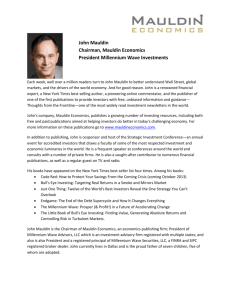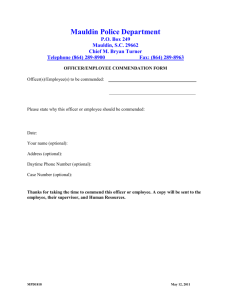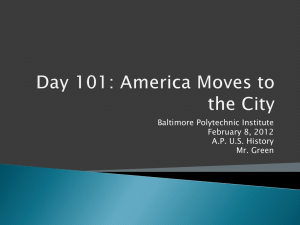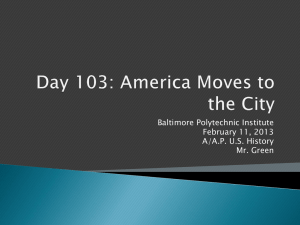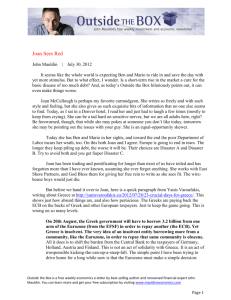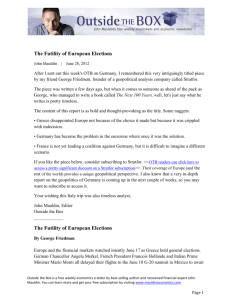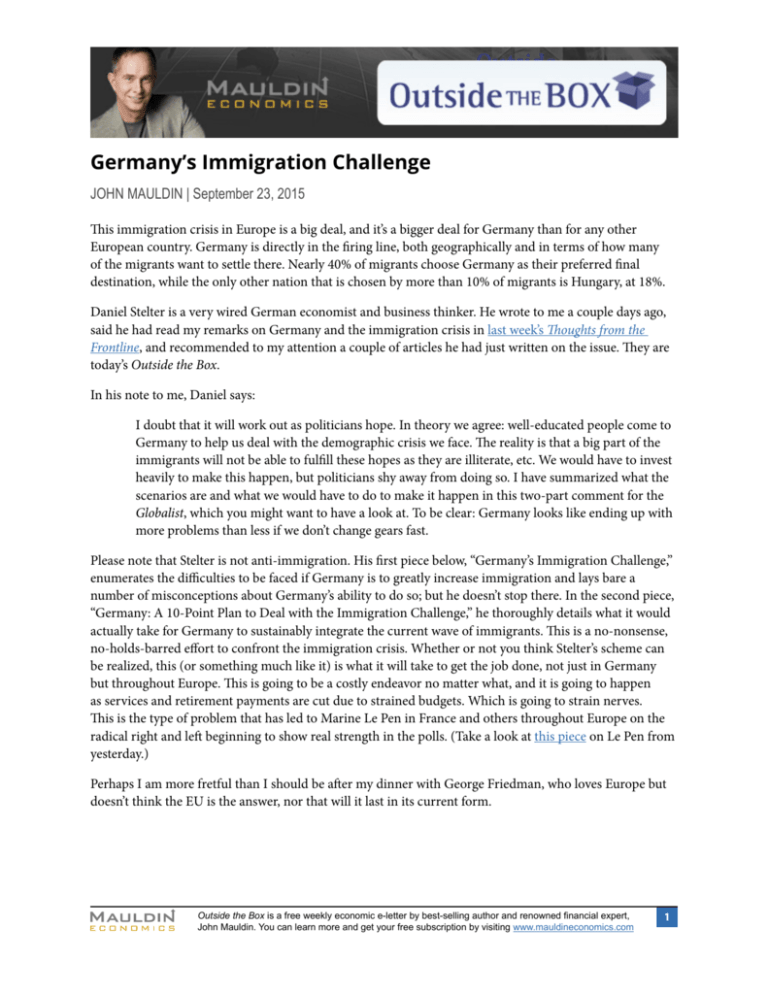
Germany’s Immigration Challenge
JOHN MAULDIN | September 23, 2015
This immigration crisis in Europe is a big deal, and it’s a bigger deal for Germany than for any other
European country. Germany is directly in the firing line, both geographically and in terms of how many
of the migrants want to settle there. Nearly 40% of migrants choose Germany as their preferred final
destination, while the only other nation that is chosen by more than 10% of migrants is Hungary, at 18%.
Daniel Stelter is a very wired German economist and business thinker. He wrote to me a couple days ago,
said he had read my remarks on Germany and the immigration crisis in last week’s Thoughts from the
Frontline, and recommended to my attention a couple of articles he had just written on the issue. They are
today’s Outside the Box.
In his note to me, Daniel says:
I doubt that it will work out as politicians hope. In theory we agree: well-educated people come to
Germany to help us deal with the demographic crisis we face. The reality is that a big part of the
immigrants will not be able to fulfill these hopes as they are illiterate, etc. We would have to invest
heavily to make this happen, but politicians shy away from doing so. I have summarized what the
scenarios are and what we would have to do to make it happen in this two-part comment for the
Globalist, which you might want to have a look at. To be clear: Germany looks like ending up with
more problems than less if we don’t change gears fast.
Please note that Stelter is not anti-immigration. His first piece below, “Germany’s Immigration Challenge,”
enumerates the difficulties to be faced if Germany is to greatly increase immigration and lays bare a
number of misconceptions about Germany’s ability to do so; but he doesn’t stop there. In the second piece,
“Germany: A 10-Point Plan to Deal with the Immigration Challenge,” he thoroughly details what it would
actually take for Germany to sustainably integrate the current wave of immigrants. This is a no-nonsense,
no-holds-barred effort to confront the immigration crisis. Whether or not you think Stelter’s scheme can
be realized, this (or something much like it) is what it will take to get the job done, not just in Germany
but throughout Europe. This is going to be a costly endeavor no matter what, and it is going to happen
as services and retirement payments are cut due to strained budgets. Which is going to strain nerves.
This is the type of problem that has led to Marine Le Pen in France and others throughout Europe on the
radical right and left beginning to show real strength in the polls. (Take a look at this piece on Le Pen from
yesterday.)
Perhaps I am more fretful than I should be after my dinner with George Friedman, who loves Europe but
doesn’t think the EU is the answer, nor that will it last in its current form.
Outside the Box is a free weekly economic e-letter by best-selling author and renowned financial expert,
John Mauldin. You can learn more and get your free subscription by visiting www.mauldineconomics.com
1
I spent much of the day and will continue long into the evening in a planning session for the 2016
Strategic Investment Conference. It will be held in Dallas May 24-27, and I truly believe it will be my best
conference ever. Part of the new emphasis is going to be on the ability of attendees to network with one
another. There are cool new technologies that allow us to do that. The biggest “problem” is trying to sort
out who the speakers will be this year: we have an embarrassment of riches. Well, that problem plus the
half-dozen other major priorities that are already demanding lots of attention. I actually remember a time
in my life when I felt that I could read the sports page and watch TV while still dealing with business and
raising seven kids, plus being involved in politics and church, etc.
The irony is that I have this fabulous media system throughout the house, and I am ashamed to say that
it is rarely used, except when kids or friends come over to watch something. I know I’m not the only
person with insufficient bandwidth, because I hear it from friends everywhere. And the availability of great
information is only going to increase. I am told that someday we’ll each have an information “butler” to
help us handle the load, but that cool new personal AI app is going to have to wait for a lot more power in
our computers and phones and monster upgrades in software.
I suppose it will come much like the speech-recognition technology that I’m using to write this letter.
Given that I’m actually a relatively slow and clumsy typist, it has really increased my productivity. But I
can’t tell you how many versions of this software I bought over the last 12 years that were not ready for
prime time. I suspect that the introduction of techno-butlers will go much the same way. We’ll endure a
lot of hype, spend our money, and be less than satisfied with the results. But by version 12.5, iButler will
actually be a tool we can’t live without. If its development proceeds at the same pace as speech-recognition,
then my personal butler might not show up ready for work until sometime in the late ’20s. On the other
hand, the technological transformation is accelerating, so…
While we’re at it, I really do hope that Mike West over at Biotime can figure out how to make a new or at
least a younger version of me, or at least the parts of me that I’m going to need, by then.
You have a great week.
Your trying not to overload your inbox analyst,
John Mauldin, Editor
Outside the Box
Outside the Box is a free weekly economic e-letter by best-selling author and renowned financial expert,
John Mauldin. You can learn more and get your free subscription by visiting www.mauldineconomics.com
2
Germany’s Immigration Challenge
We have to make an honest assessment of costs and benefits of the migration crisis.
By Daniel Stelter
September 13, 2015
Germany is considered a rational, fact-driven country, not an emotionally driven one. And yet, based on
the current immigration debate in Germany, even the advocates of more immigration have little more to
offer than emotional arguments.
Given our nation’s history, Germans want to help wherever and however possible. Offering asylum to those
in danger is deeply rooted in our society and even those who look for a better living are welcomed by a
large segment of German society.
The advocates of more openness point to the benefits which an aging and shrinking population receives
from more immigration and they see the potential costs
as rather minimal, at least for a rich country like
Germany.
That is a rather rose-tinted assumption because it
underestimates the financial costs, overestimates the
benefits from immigration and clearly overestimates the
financial capacity of Germany.
Being overly optimistic helps neither the immigrants themselves nor the cause of promoting greater
openness in German society.
Tremendous costs
Proponents of more immigration to Germany refer to the shrinking workforce and the significant
unfunded liabilities for pensions and health care, estimated at least at about four times the country’s GDP.
The ultimate answer about how significant more immigration is in that context depends on what the net
contribution of immigrants is to the German economy.
Aside from the fact that the answer is very contested, even well beyond the realm of politics in the field
of academic literature, there is an additional problem. No one can tell for sure, as the qualification of
immigrants, especially refugees, is not registered.
Supporters of immigration point to the high number of academics immigrating, such as Syrian doctors.
Critics point to a high number of uneducated and illiterate people. Most probably, Germany is receiving a
mix of both, very well educated and uneducated people.
Even making a very optimistic assumption – that 50% of the one million immigrants expected in 2015 are
well educated, willing to be integrated and want to contribute to the German society, while the other 50%
will remain largely dependent on public support – we can make a simple calculation.
Outside the Box is a free weekly economic e-letter by best-selling author and renowned financial expert,
John Mauldin. You can learn more and get your free subscription by visiting www.mauldineconomics.com
3
If the 50% share of skilled immigrants before long were to earn 80,000 euros on a per capita basis – well
above Germany’s average income of about 40,000 euros – and paid taxes of 40%, their annual contribution
to society in form of taxes would be about 16 billion euros per year.
Availability of only high-skill jobs
At the same time, assuming a social welfare cost of about 25,000 euros per “non-productive”
immigrant, those costs would total 12.5 billion euros annually. That would still leave a positive net
contribution to German society and the nation’s economy
This underscores that it is obviously critical from an economic point of view to attract a high share of
productive immigrants.
But this matters for more than just economic considerations. As an advanced industrial democracy,
Germany offers plentiful immigration opportunities for skilled people.
However, unlike the past when large swaths of low-skilled people came to Germany, the supply of
low-skilled jobs in the manufacturing sector is drying up quite rapidly, not least due to the increased
automation of German industry.
What is available are jobs in the services economy which require language skills and an ability to do
abstract reasoning. Germany ought to be quite focused on this issue – not because it is heartless but
prudent.
The country has made plenty of mistakes on the immigration front in the past, which ought not to be
repeated. Not embracing an active, skills-based approach to the management of immigration – à la Canada
or Australia – was one such mistake.
Does it matter?
Of course, one could conclude that net costs of a few billion per year do not matter for a country as rich as
Germany. This is true – but only from the current perspective.
If one shifts from static to dynamic analysis and realizes that immigration into Germany may very well
continue at the current speed, the picture looks quite different.
•
Assuming a total pool of five million immigrants flowing in and a more likely mix of 30% skilled
immigrants to 70% unskilled or low-skilled ones, the net costs would rise to 38 billion euros per year.
•
Over a time horizon of 30 years, this would easily lead to costs of more than one trillion Euros. That
is close to the entire costs of German reunification between 1990 and 2010.
Not as rich as it claims
Let’s also understand that Germany is not as rich as it claims. Besides the unfunded liabilities for the aging
society of more than 400% of GDP, the strategy to exit from nuclear energy is expected to cost German
consumers and businesses about 1 trillion euros.
Even that might be manageable if the euro were structured in a sound manner. As things stand, rescuing
the Euro will at least cost another trillion euros. Add in the backlog of investments in public infrastructure
and another trillion euros is gone.
Outside the Box is a free weekly economic e-letter by best-selling author and renowned financial expert,
John Mauldin. You can learn more and get your free subscription by visiting www.mauldineconomics.com
4
A plan for immigration
Obviously, Germany needs to spend its money intelligently. But we also need to change our behavior.
From both an economic point of view, as well as from a humanitarian point of view and from the vantage
point of providing of solid integration perspective in German society, we have to make the best out of the
wave of immigration coming to Europe and Germany.
Germany: A 10-Point Plan to Deal With the Immigration Challenge
What does it take to make sure that the immigrants now arriving are integrated in a sustainable manner?
By Daniel Stelter
September 14, 2015
Reduce bureaucracy
The process of accepting someone as a refugee in Germany takes too long. We need to define safe
countries, like Albania, and send immigrants from these countries back directly.
With all sympathy for their interest in a better living, they are not
threatened by war or discrimination. On the other hand, refugees
from countries in (civil) war should be accepted fast.
Get to work
Here is a proposal for a
10-point program for how
to deal with the challenge
of immigration.
It is very important to get immigrants into work once they are in
Germany. It is bad for both skills and motivation levels if people
cannot work.
1. Reduce Bureaucracy
Learning the German language is of utmost importance and should
be mandatory. Ideally from day one onwards, immigrants should
have to start learning the language.
3. Significant investments in
education and integration
And as long as the immigrants don’t have a job, they should do
community service. This advances their integration into society
and would give a clear signal: Everyone coming to Germany has to
contribute to the common good with his or her abilities.
5. Mandatory schooling
Significant investments in education and integration
7. Permanent
We need to register skills in order to find the appropriate job or
define the necessary next steps in education. Education will the
biggest challenge.
8. Help in the poor
countries
German schools even today fail to integrate and educate the children
(and grandchildren) of migrants who have been in the country in
some cases for some decades.
2. Get to work
4. Defend our values
6. Recruit qualified
immigrants
9. Fostering peace
10. Be All In
Outside the Box is a free weekly economic e-letter by best-selling author and renowned financial expert,
John Mauldin. You can learn more and get your free subscription by visiting www.mauldineconomics.com
5
The school performance of children from Turkey, the Arab world and Africa is significantly below the
average. We need to invest significantly, as this will define which share of migrants will become productive
members of our society and which share will depend on social welfare.
Defend our values
Not only skills and language are important. In addition, we need to emphasize our principles and values.
This includes freedom of speech and religion, women’s rights, tolerance for minorities and non-violence.
We have to make clear that integration will only work this way and is expected from everyone. Simply
arriving is not enough to stay.
Canada, while generally being very welcoming to immigration, every year sends back about 10,000
immigrants – not necessarily for lack of integration, but it is not a one-way street.
Mandatory schooling
Participation in language school and courses on values and rules in Germany need to be mandatory for
every new arrival. Just as Brazil does with its bolsa familia, the payment of social welfare should be linked
to language and values training.
In doing so, we would convey the image of Germany as we should – a country willing to help, but also a
country in which everyone has to make a contribution. Everyone who expects help and support needs to
be willing to learn the language.
Recruit qualified immigrants
It is clear that a selection process as in Canada and Australia succeeds in attracting better-qualified
migrants.
Besides refugees from war and people in their home countries, who need our support and where economic
considerations should play no role, Germany should become more attractive for well-qualified migrants
and be more active in advertising the opportunity to build a new life here.
As a consequence, we should actively open the way for legal immigration to Germany. As a result, the
applicants could spend their savings on building a new life here, instead of spending it on smugglers.
Permanent
Both sides, the migrants and the German population, need to accept immigration as a lifetime decision. It
is not a temporary refuge.
Again, Canada proves the point: If it is seen as permanent, both sides, the migrant and the accepting
country, work harder to make integration work.
That has been a particular shortcoming of Germany’s immigration policies in the past, especially regarding
Turks.
Outside the Box is a free weekly economic e-letter by best-selling author and renowned financial expert,
John Mauldin. You can learn more and get your free subscription by visiting www.mauldineconomics.com
6
Help in the poor countries
It would be cheaper and more effective to help the people in safe countries such as Albania, who aim for a
better life, with direct financial and organizational support. The EU should invest there and help to build
democratic institutions and a working rule of law.
Fostering peace
The current wave of immigration is the result of conflicts which have lasted for decades already – and will
likely last decades more.
This is amplified by a demographic development which leads to a high number of young people without a
credible perspective of finding a job in their home country. This, in turn, increases the propensity not just
for social strife, but even for (civil) war.
The West needs to reconsider its strategy fundamentally. The current U.S.-led approach of favoring
military intervention over development aid only leads to even more destabilization.
Be all in
The humanitarian and financial costs of such a strategy are enormous. But if we don’t do this, we will have
much higher costs to incur.
Whoever speaks of the benefits of immigration also needs to make sure that all the groundwork is laid so
that the possible benefits are also realized. Making the necessary investments can by no means be taken for
granted.
In conclusion, the current and future wave of immigration to Germany could be beneficial for our country
– but only if we address the challenge with full force.
Unfortunately, it seems as if, just as in the eurozone crisis, that our various countries’ leaderships –
Germany’s included – are failing at the task.
There is no denying that any solution involves shouldering huge costs for all citizens, natives and migrants.
Those who hope that the wave will end soon should think again: Sub-Saharan Africa’s population is about
to grow by 600 million over the next 20 years.
100 million or more of those mostly young people will look for a better life in the north. We had better
learn now how to deal with it.
Copyright 2015 John Mauldin. All Rights Reserved.
Share Your Thoughts on This Article
Post a Comment
Like Outside the Box? Then we think you’ll love John’s premium product, Over My Shoulder. Each week
John Mauldin sends his Over My Shoulder subscribers the most interesting items that he personally cherry
picks from the dozens of books, reports, and articles he reads each week as part of his research. Learn more
about Over My Shoulder
Outside the Box is a free weekly economic e-letter by best-selling author and renowned financial expert,
John Mauldin. You can learn more and get your free subscription by visiting www.mauldineconomics.com
7
Outside the Box is a free weekly economic e-letter by best-selling author and renowned financial expert, John Mauldin. You can learn more and get
your free subscription by visiting http://www.mauldineconomics.com.
Please write to subscribers@mauldineconomics.com to inform us of any reproductions, including when and where copy will be reproduced. You must
keep the letter intact, from introduction to disclaimers. If you would like to quote brief portions only, please reference http://www.mauldineconomics.
com.
To subscribe to John Mauldin’s e-letter, please click here: http://www.mauldineconomics.com/subscribe/
To change your email address, please click here: http://www.mauldineconomics.com/change-address
If you would ALSO like changes applied to the Mauldin Circle e-letter, please include your old and new email address along with a note requesting the
change for both e-letters and send your request to compliance@2000wave.com.
To unsubscribe, please refer to the bottom of the email.
Outside the Box and JohnMauldin.com is not an offering for any investment. It represents only the opinions of John Mauldin and those that he
interviews. Any views expressed are provided for information purposes only and should not be construed in any way as an offer, an endorsement,
or inducement to invest and is not in any way a testimony of, or associated with, Mauldin’s other firms. John Mauldin is the Chairman of Mauldin
Economics, LLC. He also is the President of Millennium Wave Advisors, LLC (MWA) which is an investment advisory firm registered with multiple
states, President and registered representative of Millennium Wave Securities, LLC, (MWS) member FINRA, SIPC. MWS is also a Commodity Pool
Operator (CPO) and a Commodity Trading Advisor (CTA) registered with the CFTC, as well as an Introducing Broker (IB) and NFA Member. Millennium
Wave Investments is a dba of MWA LLC and MWS LLC. This message may contain information that is confidential or privileged and is intended only
for the individual or entity named above and does not constitute an offer for or advice about any alternative investment product. Such advice can only
be made when accompanied by a prospectus or similar offering document. Past performance is not indicative of future performance. Please make sure
to review important disclosures at the end of each article. Mauldin companies may have a marketing relationship with products and services mentioned
in this letter for a fee.
Note: Joining the Mauldin Circle is not an offering for any investment. It represents only the opinions of John Mauldin and Millennium Wave
Investments. It is intended solely for investors who have registered with Millennium Wave Investments and its partners at www.MauldinCircle.com
or directly related websites. The Mauldin Circle may send out material that is provided on a confidential basis, and subscribers to the Mauldin Circle
are not to send this letter to anyone other than their professional investment counselors. Investors should discuss any investment with their personal
investment counsel. John Mauldin is the President of Millennium Wave Advisors, LLC (MWA), which is an investment advisory firm registered with
multiple states. John Mauldin is a registered representative of Millennium Wave Securities, LLC, (MWS), an FINRA registered broker-dealer. MWS
is also a Commodity Pool Operator (CPO) and a Commodity Trading Advisor (CTA) registered with the CFTC, as well as an Introducing Broker (IB).
Millennium Wave Investments is a dba of MWA LLC and MWS LLC. Millennium Wave Investments cooperates in the consulting on and marketing of
private and non-private investment offerings with other independent firms such as Altegris Investments; Capital Management Group; Absolute Return
Partners, LLP; Fynn Capital; Nicola Wealth Management; and Plexus Asset Management. Investment offerings recommended by Mauldin may pay
a portion of their fees to these independent firms, who will share 1/3 of those fees with MWS and thus with Mauldin. Any views expressed herein are
provided for information purposes only and should not be construed in any way as an offer, an endorsement, or inducement to invest with any CTA,
fund, or program mentioned here or elsewhere. Before seeking any advisor’s services or making an investment in a fund, investors must read and
examine thoroughly the respective disclosure document or offering memorandum. Since these firms and Mauldin receive fees from the funds they
recommend/market, they only recommend/market products with which they have been able to negotiate fee arrangements.
PAST RESULTS ARE NOT INDICATIVE OF FUTURE RESULTS. THERE IS RISK OF LOSS AS WELL AS THE OPPORTUNITY FOR GAIN
WHEN INVESTING IN MANAGED FUNDS. WHEN CONSIDERING ALTERNATIVE INVESTMENTS, INCLUDING HEDGE FUNDS, YOU SHOULD
CONSIDER VARIOUS RISKS INCLUDING THE FACT THAT SOME PRODUCTS: OFTEN ENGAGE IN LEVERAGING AND OTHER SPECULATIVE
INVESTMENT PRACTICES THAT MAY INCREASE THE RISK OF INVESTMENT LOSS, CAN BE ILLIQUID, ARE NOT REQUIRED TO PROVIDE
PERIODIC PRICING OR VALUATION INFORMATION TO INVESTORS, MAY INVOLVE COMPLEX TAX STRUCTURES AND DELAYS IN
DISTRIBUTING IMPORTANT TAX INFORMATION, ARE NOT SUBJECT TO THE SAME REGULATORY REQUIREMENTS AS MUTUAL FUNDS,
OFTEN CHARGE HIGH FEES, AND IN MANY CASES THE UNDERLYING INVESTMENTS ARE NOT TRANSPARENT AND ARE KNOWN ONLY
TO THE INVESTMENT MANAGER. Alternative investment performance can be volatile. An investor could lose all or a substantial amount of his or
her investment. Often, alternative investment fund and account managers have total trading authority over their funds or accounts; the use of a single
advisor applying generally similar trading programs could mean lack of diversification and, consequently, higher risk. There is often no secondary
market for an investor’s interest in alternative investments, and none is expected to develop.
All material presented herein is believed to be reliable but we cannot attest to its accuracy. Opinions expressed in these reports may change without
prior notice. John Mauldin and/or the staffs may or may not have investments in any funds cited above as well as economic interest. John Mauldin can
be reached at 800-829-7273.
Outside the Box is a free weekly economic e-letter by best-selling author and renowned financial expert,
John Mauldin. You can learn more and get your free subscription by visiting www.mauldineconomics.com
8



